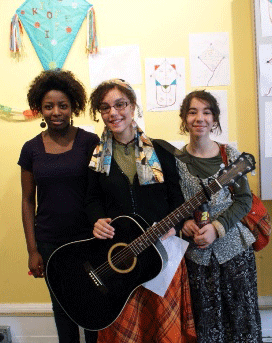
Inter-generational conflict brings with it significant challenges for community workers. And conflict can be especially complex in migrant communities, where old and young people alike have to negotiate the ways of the ‘old’ and ‘new’ countries. Sometimes, these challenges can lead to seemingly intractable and irresolvable differences. Grandparents can feel estranged from grandchildren; communities can become divided.
The Kite of Life methodology was developed as a meaningful way to respond to requests from refugee and migrant communities about inter-generational conflict within families.
The Kite of Life draws on the success of other collective narrative practice methodologies, such as the Team of Life and the Tree of Life. Its genesis was in St James Town, a large housing block in downtown Toronto, Canada. St James town has a significant population of migrant residents, including people from Africa and of Tamil background. When asked what cultural practices were meaningful to them, many residents spoke of kite-flying.
In that first workshop, old and young alike told us that kites are associated with fun and delight, and are objects of beauty and prettiness. We heard about how kite-flying is peaceful, not stressful. We also heard about long histories of making kites and what it is like to fly kites. Community members described the artistry of kite-flying, including the challenge and the difficulty: there is an art to reading the wind and riding it.
In this way, kite-flying provides a rich source of metaphor for many migrant families. It’s a great place to begin conversations about what people hold precious, and their skills and knowledges of life. These cultural values, skills, and knowledges are often shared across the generations, and evoking rich stories about them can be incredibly strengthening of inter-generational connections.
This workshop will take you step-by-step through the process of running the Kite of Life with the people you work with. Like other collective narrative practices, it’s specifically designed so that it can be used by community workers of all types – whether in school settings, hospitals, housing blocks, or community settings – as well as simply by dedicated community members. No prior experience in narrative practice (or kite flying!) is required.
When: Next workshop date to be announced
To register:
To register, contact the Course Co-ordinator, Dulwich Centre:
Email: dulwich@dulwichcentre.com.au
Hutt St PO Box 7192
Adelaide 5000 South Australia
Fax: +(61-8) 8232 4441
Phone : +(61-8) 8223 3966
